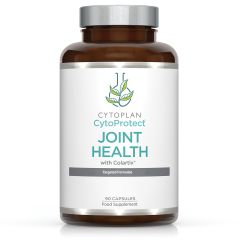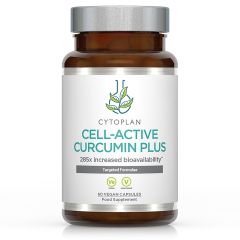How can I support my joints for osteoarthritis?
Osteoarthritis (OA) is characterised by the deterioration of cartilage in the joints, which results in the bones rubbing together, causing stiffness, pain, and impaired movement. It is a relatively common condition; 80% of over 50s will display some evidence of OA – but the good news is that a range of specially selected nutrients may help to repair the cartilage and reduce pain and stiffness.
- Collagen Type II is the main structural component of cartilage, accounting for around 60%, and provides structure, firmness and resistance to compression.
- Hyaluronic acid and chondroitin sulphate account for approximately 40% of cartilage and are essential for maintaining a cushioned and lubricated joint environment, allowing for easy joint movement.
- Glucosamine is naturally synthesised in the body and stimulates the production of the building blocks of cartilage. Levels may decrease as we age, resulting in the cartilage losing its shock-absorbing and gel-like functions.
- MSM contains a high level of sulphur, which is important for maintaining normal connective tissue, and it also demonstrates anti-inflammatory properties.
- Vitamin C is essential for the body to produce collagen, and intake has been associated with a decreased risk of developing OA. There is also evidence that vitamin C can be useful for musculoskeletal pain relief.
Other nutrients including vitamins A, D and E, B6, zinc, copper and boron are all essential for collagen production. A deficiency in any one of these nutrients will contribute to accelerated joint degeneration. Therefore, it is recommended to use a multivitamin and mineral to ensure optimal intake of all nutrients.
Inflammation plays a major role in osteoarthritis by contributing to both pain and degradation of the joints, therefore interventions to reduce inflammation are essential for supporting the wellbeing of those with OA. Nutrients to consider include:
Boswellia
An Ayurvedic herb that exhibits anti-inflammatory effects that have been shown to significantly suppress both the pain and immobility associated with OA, with the effects taking as little as a week to occur.
Omega 3 fatty acids
These should be increased through dietary sources such as oily fish, flax and chia seeds or a supplement rich in EPA, which is converted by the body into anti-inflammatory prostaglandins. It is also important to reduce foods high in omega 6 such as farmed meats, dairy products and vegetable oils (such as sunflower and corn oils) as these can be converted to pro-inflammatory prostaglandins. The ratio of omega 6 to 3 is very important, most people are consuming too high a level of omega 6 to 3 and therefore are tipping their body into an inflammatory state.
Curcumin
The active ingredient in turmeric has been widely documented to inhibit inflammation and may reduce the pain associated with OA.









